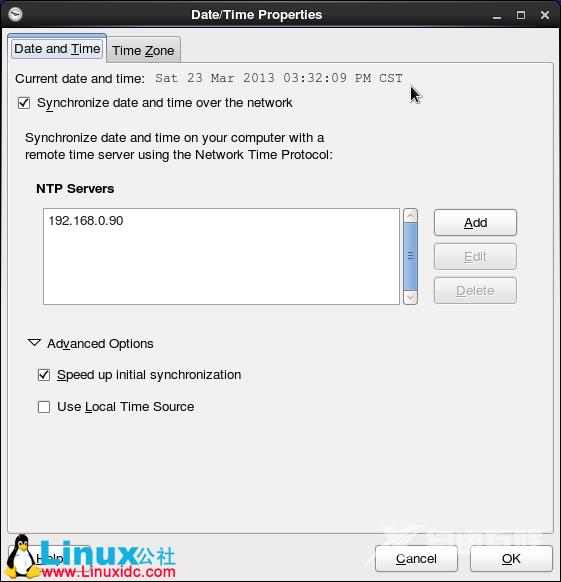nsitionalENhttp:www.w3.orgTRxhtml1DTDxhtml1-transitional.dtd Server [root@rhel6 ~]# vi /etc/ntp.conf restrictdefault nomodify //允许任何IP的客户机进行时间同步 restrict 192.168.0.0 mask 255.255.255.0 nomodify notrap //允许192.
nsitionalENhttp:www.w3.orgTRxhtml1DTDxhtml1-transitional.dtd
[root@rhel6 ~]# vi /etc/ntp.confrestrictdefault nomodify //允许任何IP的客户机进行时间同步 restrict 192.168.0.0 mask 255.255.255.0 nomodify notrap //允许192.168.0.0/24网段的客户机进行时间同步 restrict 127.0.0.1 server 127.127.1.0 //时间发生器的地址(主板上) #server 127.127.1.254 //时间发生器的地址(铯原子) fudge 127.127.1.0 stratum 10 driftfile /var/lib/ntp/drift broadcastdelay 0.008 [root@rhel6 ~]# /etc/init.d/ntpd start [root@rhel6 ~]# ntpq -p remote refid st t when poll reach delay offset jitter ============================================================================== *LOCAL(0) .LOCL. 10 l 5 64 377 0.000 0.000 0.000 由于 ntpd 的 server/client 之间的时间误差不允许超过1000秒,因此如果时间相差太长,可以先通过ntpdate手动进行时间同步。 [root@rhel6-2 ~]# ntpdate -q 192.168.0.90 //只查看而不更新时间server 192.168.0.90, stratum 11, offset 0.035703, delay 0.02579 23 Mar 15:48:05 ntpdate[3104]: adjust time server 192.168.0.90 offset 0.035703 sec [root@rhel6-2 ~]# ntpdate 192.168.0.90 23 Mar 15:48:41 ntpdate[3121]: adjust time server 192.168.0.90 offset 0.037200 sec [root@rhel6-2 ~]# system-config-date
#
[root@rhel6-2 ~]# ntpq ntpq> peer remote refid st t when poll reach delay offset jitter ============================================================================== *rhel6 LOCAL(0) 11 u 16 64 377 0.244 67.480 34.454 remote :响应这个请求的NTP服务器的名称 refid :NTP服务器使用的上一级ntp服务器 st :remote远程服务器的级别.从高到低可以设定为1-16.为了减缓负荷和网络堵塞,原则上应该避免直接连接到级别为1的服务器的. when :上一次成功请求之后到现在的秒数。 poll :本地机和远程服务器多少时间进行一次同步(单位为秒).在一开始运行NTP的时候这个poll值会比较小,那样和服务器同步的频率也就增加了,可以尽快调整到正确的时间范围,之后poll值会逐渐增大,同步的频率也就会相应减小 reach :这是一个八进制值,用来测试能否和服务器连接.每成功连接一次它的值就会增加 delay :从本地机发送同步要求到ntp服务器的round trip timeoffset :主机通过NTP时钟同步与所同步时间源的时间偏移量,单位为毫秒(ms)。offset越接近于0,主机和ntp服务器的时间越接近 jitter :这是一个用来做统计的值.它统计了在特定个连续的连接数里offset的分布情况.简单地说这个数值的绝对值越小,主机的时间就越精确

